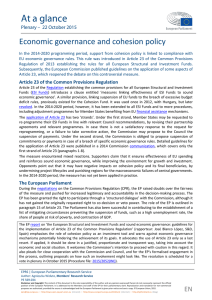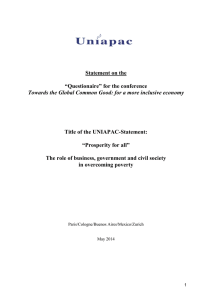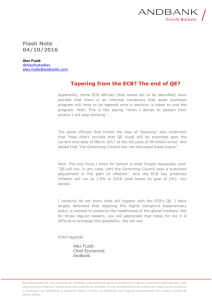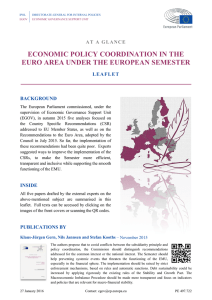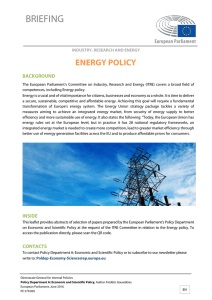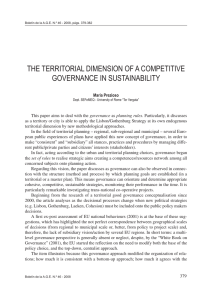2. Firma invitada.pmd - Revista Universitaria Europea (RUE)
Anuncio
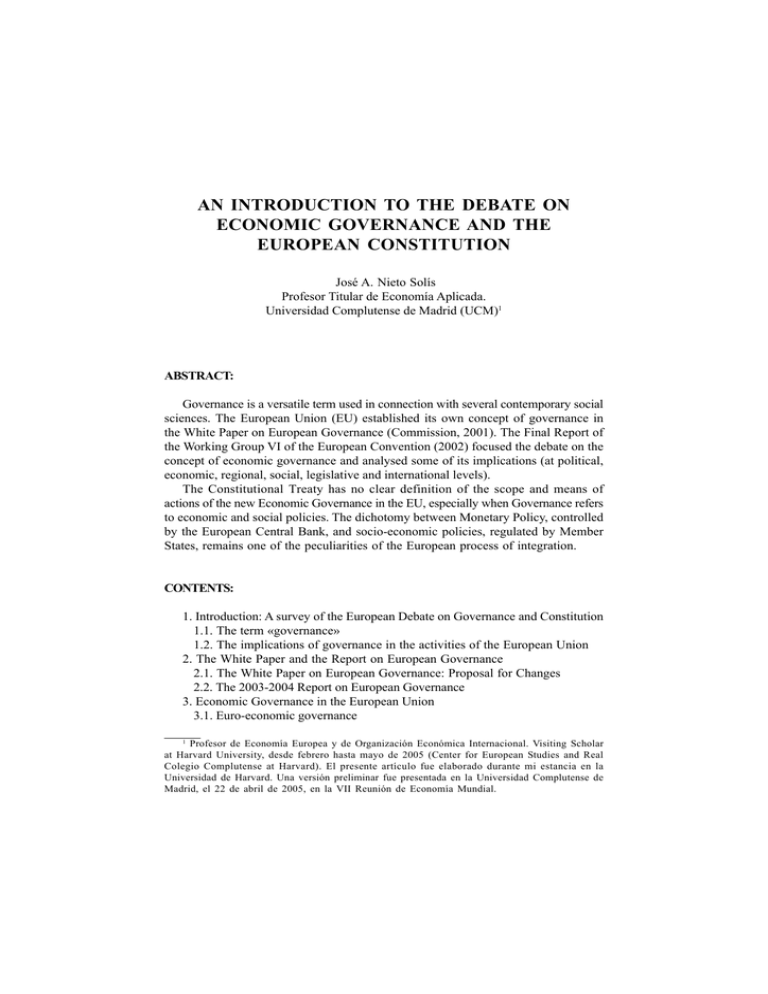
AN INTRODUCTION TO THE DEBATE ON ECONOMIC GOVERNANCE AND THE EUROPEAN CONSTITUTION José A. Nieto Solís Profesor Titular de Economía Aplicada. Universidad Complutense de Madrid (UCM)1 ABSTRACT: Governance is a versatile term used in connection with several contemporary social sciences. The European Union (EU) established its own concept of governance in the White Paper on European Governance (Commission, 2001). The Final Report of the Working Group VI of the European Convention (2002) focused the debate on the concept of economic governance and analysed some of its implications (at political, economic, regional, social, legislative and international levels). The Constitutional Treaty has no clear definition of the scope and means of actions of the new Economic Governance in the EU, especially when Governance refers to economic and social policies. The dichotomy between Monetary Policy, controlled by the European Central Bank, and socio-economic policies, regulated by Member States, remains one of the peculiarities of the European process of integration. CONTENTS: 1. Introduction: A survey of the European Debate on Governance and Constitution 1.1. The term «governance» 1.2. The implications of governance in the activities of the European Union 2. The White Paper and the Report on European Governance 2.1. The White Paper on European Governance: Proposal for Changes 2.2. The 2003-2004 Report on European Governance 3. Economic Governance in the European Union 3.1. Euro-economic governance 1 Profesor de Economía Europea y de Organización Económica Internacional. Visiting Scholar at Harvard University, desde febrero hasta mayo de 2005 (Center for European Studies and Real Colegio Complutense at Harvard). El presente artículo fue elaborado durante mi estancia en la Universidad de Harvard. Una versión preliminar fue presentada en la Universidad Complutense de Madrid, el 22 de abril de 2005, en la VII Reunión de Economía Mundial. 10 JOSÉ A. NIETO SOLÍS 3.2. The role of the European Central Bank 3.3. A European Economic and Financial Constitution 3.4. The Open Method of Coordination 3.5. Economic Governance. The Final Report of the Convention (Institutional, Monetary and Economic Issues) 4. Conclusion Annex: References to governance as a general concept and selected articles of the European Constitutional Treaty 1. INTRODUCTION: A SURVEY OF THE EUROPEAN DEBATE ON GOVERNANCE AND CONSTITUTION 1.1. The term «governance» «Governance» is a versatile term used in connection with several contemporary social sciences, especially Economics and Political Science. It originates from the need to convey diverse meanings not covered by the term «government» as it is traditionally used in social sciences. Referring to the exercise of power, governance embraces actions carried out by executive, legislative and judicial bodies. It also has a corporate meaning (economic and political management) and an international or global scope (international institutions). The term governance corresponds to the «so-called» post-modern approach of social organisations2. The EU established its own concept of governance in the White Paper on European Governance, published by the European Commission in 20013. In the White Paper, governance referred to the rules, processes and behaviour that affect the way in which powers are exercised at a European level, particularly with regards to the «five principles of good governance»: openness, participation, accountability, effectiveness and coherence (see below). These five principles of good governance reinforce those of subsidiarity (and proportionality) and transparency (and democracy) established as general principles of the Union in the European Constitution. Together, these seven principles could be considered the pillars of European Governance. Therefore, the term governance concerns the way in which the Union uses the powers given to it by its citizens. It means that the concept of governance has implications in different areas of the European integration process. 2 See definition in www.europa.eu.int. According to the political scientist Roderick Rhodes, the concept of governance is currently used in contemporary social sciences with at least six different meanings: the minimal State, corporate governance, new public management, good governance, social-cybernetic systems and self-organized networks. 3 «European Governance. A White Paper»: COM(2001) 428 final, 25 July 2001. AN INTRODUCTION TO THE DEBATE ON ECONOMIC GOVERNANCE AND THE EUROPEAN 11 1.2. The implications of governance in the activities of the European Union I) The White Paper and its implementation referred to five basic principles, openness, participation, accountability, effectiveness and coherence, which reinforce subsidiarity and proportionality (multi-level organization), and transparency and democracy (closer union to the citizens) established in the European Constitution4. II) Governance also refers to European public space and better lawmaking, which implies reforms in: – Participation of civil society (the use of expertise; decentralisation through agencies) – Regulations (EU policy impact assessment; the application of common legislation) – Coordination (the convergence of national policies; Open Method of Coordination) III) Geographical decentralization (multi-level governance) and Regional and local dimension of the EU: – Permanent dialogue with associations of regions and cities. – Target-based tripartite agreement and contracts. – A networked Europe. – Economic governance (see below V). – Corporate governance5 and corporate social responsibility. – Refocusing policies and institutions (governance and the European Constitution, governance and committee procedures). IV) As part of the process of preparing the White Paper on Governance, the Commission made recommendations on how to strengthen the European Union’s contribution to global governance. The Union should seek to apply the principles of good governance to its global responsibilities and endeavour to boost the effectiveness and enforcement powers of international institutions6 External and 4 Report on European Governance: COM(2002) 705 final, Brussels, 11-12-2002. The Economic and Social Committee of the Union considers «subsidiarity as basic and most important principle of governance» and suggests focusing on three axes: better governance, involving civil society, and better regulation. There are two complementary dimensions of subsidiarity: functional or horizontal subsidiarity and regional or vertical subsidiarity. Other important principles are transparency and communication. Brussels, 20 March, 2002 («Opinion on the White Paper of Governance»). 5 See: COM(2003) 284 final, «Modernizing Company Law and Enhanced Corporate Governance in the European Union –A Plan to Move Forward», Brussels 21-5-2003. 6 External and Security Common Policy (and Governance and Development). See: Commission report on European governance (COM(2002) 705, 11 December 2002), Communication on EU neighbourhood policies («Wider Europe», COM(2003) 104 final, 11 March 2003) and Communication on human rights in the Mediterranean region (COM (2003)294 final, 21 May 2003). On 20 October 2003, the Commission adopted a Communication on governance and development (COM (2003) 615), which sets out a new, more pragmatic vision of countries’ effectiveness in eradicating poverty and promoting sustainable development in the world. On the basis of lessons learned from the governance approaches adopted by the Commission and other 12 JOSÉ A. NIETO SOLÍS Security Common Policy (and Governance and Development). See: Commission report on European governance (COM(2002) 705, 11 December 2002), Communication on EU neighbourhood policies («Wider Europe», COM(2003) 104 final, 11 March 2003) and Communication on human rights in the Mediterranean region (COM (2003)294 final, 21 May 2003). On 20 October 2003, the Commission adopted a Communication on governance and development (COM (2003) 615), which sets out a new, more pragmatic vision of countries’ effectiveness in eradicating poverty and promoting sustainable development in the world. On the basis of lessons learned from the governance approaches adopted by the Commission and other donors, and taking account of the views of partner countries and their own experiences, the Commission Communication aims at identifying practical ways of: a) building capacity for governance and increasing partner countries’ input into the formulation of relevant reform programs; b) ensuring synergy and consistency between the various Commission and EU instruments and policies; . V) More precisely, the concept of Economic Governance has several implications: – The Final Report on Economic Governance (Group VI of the European Convention) begins by recommending that the economic and social objectives of the EU should be included in the Constitutional Treaty. – The Report makes a clear distinction between monetary policy and economic policy. It restates that exclusive competence for European monetary policy lies with the Community and is exercised by the European Central Bank (ECB). Whereas, competence for economic (and social) policy lies with the Member States. – The Report stresses the need to improve coordination between the (macro)economic policies of the Member States, whether or not the instruments for that improvement are to be included in the Treaty. – Although the «recommendations» were not unanimously endorsed, the Working Group VI of the Convention proposed the following: a) Broad Economic Policy Guidelines (BEPG). BEPG should be adopted by the Council of the EU, with a provision for the European Parliament (EP) to be donors, and taking account of the views of partner countries and their own experiences, the Commission Communication aims at identifying practical ways of: a) building capacity for governance and increasing partner countries’ input into the formulation of relevant reform programs; b) ensuring synergy and consistency between the various Commission and EU instruments and policies; c) reinforcing development partnerships on a national or regional basis with a view to achieving coordination between donors’ priorities and partner countries’ agendas by way of policy dialogue, as well as complementarity between fund providers; d) contributing to protecting human rights, spreading democracy, good governance and the rule of law. AN INTRODUCTION TO THE DEBATE ON ECONOMIC GOVERNANCE AND THE EUROPEAN 13 consulted on the draft of BEPG. Consideration could be given to strengthening the role of the Commission. In the event of non-compliance, the Commission would issue a warning directly to the Member State concerned, and the Council of the EU would decide on the measures to be taken on a proposal from the Commission. b) Stability and Growth Pact (SGP). In the event of an excessive government deficit, the Commission would issue a warning directly to the Member State concerned, and the Council of the EU would decide on the measures to be taken. The Commission’s role in this aspect could be strengthened. c) Open Method of Coordination (OMC): The European Parliament should be systematically involved in the Open Method of Coordination. The objectives, procedures and limits of the method should be included in the Treaty. d) Taxation: Some Working Group members proposed minimum standards in fiscal policies in order to improve the functioning of the internal market. Decision-making procedures should allow the approximation of rates and the establishment of minimum standards for indirect and company taxation. Internal market and environmental protection measures could be adopted by qualified majority voting (QMV) in the Council of the EU. e) Lastly7, the Group VI stresses the importance of maintaining the Euro-group and the opportunities for informal contacts between the Euro-group, the European Central Bank (ECB) and the Commission. It stresses the need to strengthen Euro-zone representation in international organizations. 2. THE WHITE PAPER AND THE REPORT ON EUROPEAN GOVERNANCE 2.1. The White Paper on European Governance: Proposal for Changes The White Paper on Governance (2001) began with an important premise: «The Union must renew the Community method8 by following a less top-down approach and complementing its policy tools more effectively with non-legislative instruments». That central idea allowed the formulation of several proposal for change the EU: 1) Better involvement and more openness. A stronger interaction with regional and local governments and civil society is needed. 7 In brief, Economic Governance in the Union concerns to: i) Economic and social objectives, BEPG and SGP. ii) Monetary policy: exclusive Community EU competence, exercised by the ECB. iii) Economic policy: competence of the Member States (improve coordination). iv) Institutions: maintain the Euro-group and improve international representation of the Euro-zone. 8 The Community method guarantees both the diversity and effectiveness of Union: The Commission makes legislative and policy proposals, the legislative and budgetary acts are adopted by the Council and the Parliament, and the Court of Justice guarantees respect for the rule of law. 14 JOSÉ A. NIETO SOLÍS 2) Better policies, regulations and delivery. The EU must assess whether action is needed and, if it is, whether it should be at Union level. To improve the quality of its policies, the Union should consider the combination of different policy tools. 3) Global governance. The EU should seek to apply the principles of good governance to it global responsibilities9. 4) Refocused Institutions. Common European Institutions and Member States must work together to set out an overall policy strategy and refocus the way they work. These proposal needed to set up a more democratic governance based on five principles, which reinforces those of proportionality-subsidiarity and transparencydemocracy10. The five principles already mentioned are: – Openness: The Institutions should work in a more open manner. They should actively communicate about what the EU does and the decisions it makes. – Participation: Improved participation, from conception to implementation, is likely to increase confidence in the result and in the Institutions which deliver policies. – Accountability: Roles in the legislative and executive processes need to be clearer. There is a need to increase clarity and responsibility of each of the Institutions and Member States involved in developing and implementing policies at whatever level. – Effectiveness: Clear objectives and evaluation of the impacts are needed. Effectiveness also depends on implementing EU policies in a proportionate manner and on making decisions at the most appropriate level. – Coherence: Policies and actions must be coherent and easily understood. Coherence requires political leadership and strong responsibility on the part of the Institutions to ensure a consistent approach within a complex system. Whit the idea of improving EU governance and enhancing its basic principles of action the Commission White Paper on Governance included several specific measures and proposals to improve the quality of its policies. It was a decisive starting point. 2.2. The 2003-2004 Report on European Governance The 2004 Report on European Governance11 followed the discussion, opened it to all EU level and sectors, reviewed the implementation of the 2001 White Paper and summarised the progress made on governance12. 9 COM(2004) 383 final: «The Social Dimension of Globalisation - the EU´s policy contribution on extending the benefits to all», Brussels, 18.5.2004. See also: COM(2001) 416 final, «Social development in the context of globalisation» 10 From the conception of policy to its implementation, the choice of the level at which action is taken (from EU to local) and the selection of the instruments used must be in proportion to the objectives pursued. This means that before launching an initiative it is essential to check: a) if public action is really needed; b) if the European level is the most appropriate one; c) if the measures chosen are proportionate to those objectives. 11 European Commission: «Report on European Governance (2003-2004)», SEC (2004) 1153, Brussels, 22-09-2004. 12 SEC(2002) 705 final, 11 December 2002. AN INTRODUCTION TO THE DEBATE ON ECONOMIC GOVERNANCE AND THE EUROPEAN 15 This Commission initiative consisted of two sets of measures: «better legislation» (aimed at improving the preparation of Community legislation) and «better application» (aimed at improving the implementation of Community policies). The main measures aimed at improving legislation related to specific areas like public consultation, impact assessment, obtaining and using expertise, and, in certain cases, using agencies at a EU level. Progress in the implementation of Union policies is related essentially to updating and simplifying legislative measures in force, improving their application and monitoring Community Law, simplifying committee procedures and facilitating the identification of priorities13. Bearing in mind the situation and the general scope of European governance, the 2004 Commission’s Report reviewed and analysed several issues: 1) The participation of civil society, meaning the adoption of new standards for public consultation and partnership agreements. These actions have not been implemented satisfactorily. There are no minimum standards of consultation and there is not enough progress in dialogues with civil society. The principles of openness and participation should be reinforced in the future. 2) A new procedure of impact analysis for all major EU initiatives, taking into account the economic, social and environmental impact of the proposal concerned. To solve existing problems, the Commission and its horizontal Directorates-General promoted a series of measures published in the 2003 General Report of the Union14. 3) Obtaining and using expertise. The Commission adopted an action plan for «Science and Society»15, but the opinions of external experts have been scarcely encouraged. 4) Updating and simplification Community legislation (acquis) was one of the main targets of the European Convention. The results seem to be quite important in this specific area. 5) Regulatory agencies. Inter-institutional discussions on the framework centred on three main points16: the scope, the legal instruments and the composition of the administrative board. There is not a binding instrument for the operating framework for regulatory agencies yet. 6) Improving the application and monitoring of the application of Community Law. In addition to the annual report of the Commission, the EU runs a website entitled Calendar for Transposition of Directives. Nevertheless, administrative cooperation between the Member States (at central, regional and local levels) should be strengthened. 13 See references to Improving Governance in the Presidency Conclusions of the European Council (Brussels, 22-23 March, 2005) 14 COM (2003) 770, 17 December 2003. General Report on the EU activities. 15 COM (2002)713, 11 December 2002. 16 COM (2002)718, final, 11 December 2002. 16 JOSÉ A. NIETO SOLÍS 7) Action at the level of Community institutions. Improving the quality of Community legislation requires closer collaboration between institutions involved in the legislative process, in particular the European Parliament and the Council of the Union. 8) Regional and local dimension of the Union. The White Paper on Governance stated that the Commission should establish a more systematic dialogue with European and national associations or regional and local authorities17. The European Parliament and the Committee of the Regions are collaborating in exploratory work in the environment field. Its results could promote regional and local dialogue in other fields, like transport policy, and could enhance Commission proposals for wider cooperation between cities and regions. 9) Refocusing policies, institutions and European Public area. The European Constitution has made a great effort to review the Community method and refocus the legislative and executive powers of the Union18. The task of making the EU more transparent and democratic (reducing the deficit of legitimacy) is fundamental to guarantee better governance and improve efficiency, stability and equity. The Union should increase its visibility and presence among citizens, as a crucial element to improve governance and, of course, reinforce the economic governance in Europe. 3. ECONOMIC GOVERNANCE IN THE EUROPEAN UNION 3.1. Euro-economic governance The introduction of the euro in 1999 created a new situation in the EU. It was the origin of the application of a «new constitution for economic policy» in most Member States (euro-zone). The Treaty of the Union established the rules for the Monetary Union, but the entry into force of the single currency changed the history of the economic policy and created a new economic space corresponding to the second largest economy in the world. According to that, the European governance extended its analytical scope to economic matters concerning the euro and to economic policy in the euro-zone. First, we should ask ourselves about the priority of economic governance in the euro-zone. Does the Union need specific rules for economic governance, and why? 17 Tripartite agreements: COM(2002) 709 final, 11 December 2002. See: Tripartite Agreement, European Commission, Italian Government, Lombardy Region, Milan, October 15 th, 2004. See also: Assembly of European Regions: First Conference on the future of European Cohesion Policy (15 November 2002) 18 European Constitution, article I-50: «In order to promote good governance and ensure the participation of civil society, the Union Institutions, bodies and agencies shall conduct their work as openly as possible». See, also, articles III-193, I-3, I-5, I-22, I-36, I-45, III-185, and I-35 for comitology (Report on European Governance, p. 14). AN INTRODUCTION TO THE DEBATE ON ECONOMIC GOVERNANCE AND THE EUROPEAN 17 The positive answer seems to be quite simple, because there is an asymmetry between centralised monetary policy and decentralised economic policies, and there could be confusion and a lack of efficiency in the economic decentralised decisions of Member States. Therefore, common rules in monetary policy need to be completed with coordination rules in the area of national economic (and social) policies. Second, the scope of the European economic and monetary policies should be questioned. In particular we ought to consider the situation of Member States that do not adopt the euro, and the situation of new Member States added to the Union in 2004. There are reciprocal effects between euro-zone (12 countries) and the rest of the Union (13 countries). Economic governance should not exclude controlling those effects. As a result, the European economic governance must include some institutional aspects concerning the new economic situation. For instance, new forms of consultation, exchanges of information and possible arrangements between the main economic actors at different levels of the EU system. And, for example, a revisited fiscal policy at the Union level, or a stronger coordination among the fiscal authorities of every country. The Maastricht Treaty and the European Constitution establish two parallel objectives: While National Governments should keep their own public finances in order, the European Central Bank has a clear and common inflation target. Nevertheless, fiscal policies are not independent from monetary policy, and therefore some specific rules for coordination of economic policies and for euro-economic governance19 are needed. Moreover, the Stability and Growth Pact comes across as the central mechanism20 of the emerging euro-economic governance and its effects on fiscal policies are unquestionable. Economic and Monetary Union in Europe would not have been possible without the predominant paradigm of macroeconomic stability. The rules and institutions put in place to ensure the single currency assumed that paradigm and created a culture of common economic governance, mainly but not only in the euro-zone. Notwithstanding the criticisms, that assumption contributed to extend the legitimacy of the Monetary Union between social actors. But the European Economic System must increase its legitimacy by developing economic and social policies if the Union wants to reinforce the common citizenship21. The lack of common social policies could handicap progress of European integration. 3.2. The role of the European Central Bank After its decisive contribution to the European Monetary Union, the opinion of the ECB has played an important role in the debate about the European Constitution. 19 Euro Economic Governance: Workshop Report, European University Institute, 2001. As the debate about the flexibility of the SGP and about the common recommendations on economic policies included in the Broad Economic Policy Guidelines of the Union demonstrates. 21 COM(2004) 137 final. Scoreboard on implementing the Social Policy Agenda. Brussels, 13-2004. 20 18 JOSÉ A. NIETO SOLÍS The ECB’s competence to deliver an opinion is based on Article 48 of the Treaty of the Union, which requires the consultation of the ECB in the event of institutional changes in the monetary area. The ECB was neither a formal member nor an official observer of the European Convention. But its President was invited to an expert hearing of the Working Group on Economic Governance on 13 September, 2002. Furthermore, in 2003 the ECB communicated comments and drafting suggestions to the Chairman of the Convention on issues that concern their activities22. The ECB considered that the Constitution simplified, streamlined and clarified the legal and institutional framework of the EU and did not affect institutional and operational stability in the monetary domain. The ECB also made suggestions about: – The objectives and competences of the Union. The ECB suggested that a clear reference to non-inflationary growth be introduced in Article I-3(3). – The institutional status of the ECB and of the European System of Central Banks (ESCB). The ECB suggested a clear reference to the ECB and the ESCB in Article I-30, under the Title of Other Institutions (and Advisory Bodies) of the Union. – The independence of the ECB. The ECB suggested a more clear paragraph in Article I-30(3) expressing that it is an Institution with a legal personality and which shall be independent for its finances. Furthermore, Article III-80 also remembers that all the ESCB members shall be independent. – The Euro-system. Under the acronym ESCB two realities coexist. On the one hand, it refers to the ECB and to the national central banks of all Member States. On the other hand, ESCB also refers to the ECB and national central banks of only those Member States that have adopted the euro. The ECB suggested introducing the term Euro-system into the Constitution (Article I-30), to refer to the second concept (euro-zone), that embodies exclusive competence for defining and conducting monetary policy, including the overall management of the euro, the management of the official foreign reserves of the Member Stares that have adopted the euro, and promoting the smooth operating payment systems23. – International representation of the euro. The ECB suggested inserting explicit references to measures adopted on the basis of articles III-90 and III-228 (international representation) and the consultation of those measures to the ECB. – The ECB also suggested other provisions and editorial changes on the draft of European Constitution. For example, in Article III-92, referred to countries which intend to adopt the euro, the ECB suggested an amendment in order to clarify the participation of those countries in the exchange-rate mechanism for at least 22 Opinion of the European Central Bank of 19 September 2003 at the request of the Council on the draft Treaty establishing a Constitution for Europe: Official Journal of the European Union (25-9-2003). 23 The actions necessary to carry out this competence require a high degree of harmonisation of procedures, instruments and infrastructures, and a single decision-making body with regulatory capacity. AN INTRODUCTION TO THE DEBATE ON ECONOMIC GOVERNANCE AND THE EUROPEAN 19 two years «without severe tensions, in particular without devaluing against the euro», instead of previous references to the «observance of the normal fluctuation margin of the Exchange Rate Mechanism of the European Monetary System24. 3.3. A European Economic and Financial Constitution In 2000, the European Council of Lisbon formulated the goal of becoming the world’s most competitive and dynamic economic area by 2010. Beyond this objective, the question of whether or not the European economy can increase its growth rate depends on the development of the Economic and Monetary Union. For this reason, the EU included in the debates of the Convention the coordination and the limits of the harmonization of economic and financial policies of the Member States. The European Constitution includes a more clear «economic constitution» based on a new organization in five categories of EU means of action: 1) Binding Regulatory Principles (stable prices, healthy public finances and monetary frameworks, a sound balance of payment, and high levels of employment and social security). 2) Exclusive Policies (policies totally transferred to the EU level to implement the customs union and to ensure the efficiency of the single market and of the monetary union). 3) Joint Policies (referred to tasks which attain fundamental common goals or prevent external or negative effects; e.g., environmental policy and economic and social cohesion). 4) Complementary policies (the EU will provide support, incentives and supplementary aid in areas like social policy, education, culture, health, research and development, consumer protection and industrial policy). 5) Coordinated areas (include policies for which the Member States bear the responsibility, even though the EU goal is of primary importance, as is the case of employment policy and economic and social policies). Although the Constitution does not provide a sufficient basis for an economic governance, reorganizing European economic issues could create a more efficient system 25. The single market, the monetary union, the basic principles of non discrimination, and the common means of action could ensure a greater degree of economic and social welfare. A more transparent decision making process will help regarding this goal. Subsidiarity and proportionality principles will reinforce EU governance. 24 The normal fluctuation margins of the ERM of the European Monetary System were +2,25%. See also the Anex of OJ of EU 25-09-2003 for ECB drafting suggestions on articles and parts of the EU Constitution. 25 «Economic and Financial Constitution», Convention Spotlight 2002/5 (www.europa.eu.int). 20 JOSÉ A. NIETO SOLÍS The financial aspects of the European economic system should take two facts into account. On the one hand, the 2004 enlargement of the Union and, as a result of it, the more heterogeneous situation nowadays. On the other, the small size of the EU Budget, and the scarce capacity of transfer mechanisms, especially for enhancing the development of backward regions. The resources for this task could became available by eliminating agricultural subsidies. But it is only possible in the context of a deep reformulation of the EU Budget, something not included in the Constitutional Treaty26. Beyond these points, the financial system of the European economy should be analysed under the premise of the monetary union, the Lisbon strategy and their objectives, and the challenges of globalisation for the new situation of the Enlarged EU. 3.4. The Open Method of Coordination At least four Working Groups of the European Convention recommended including the Open Method of Coordination (OMC) within the Constitutional Treaty. Those Working Groups were Economic Governance, Social Europe, Simplification and Complementary Competences. The reasons of that coincidence stem from widespread recognition of the usefulness, efficiency, and flexibility of this new form of national policy coordination for dealing jointly with issues of common interest to the Member States27. Several final reports on the Convention28, in addition to the Lisbon Strategy, proposed extending OMC to a broad range of other policy domains, like information society, enterprise policy, research and development, education and training, combating social exclusion and modernising social protection. OMC encourages convergence of national objectives and policies. It is particularly well suited to identifying common interests among Member States. It pursues flexible, horizontal and multilevel cooperation rather than supranational or intergovernmental institutional procedures. Despite consensus on the importance of OMC, there still remain serious doubts about how to implement it. For instance, what are the legal instruments in each kind of the several categories of actions and policies of the Union? And where are the limits of the flexibility procedure of coordination to adopt more efficient decisions? We should think on the answers to these questions in the case of economic and social 26 See: «Building our common future. Policy challenge and Budgetary means of the Enlarged Union 2007-2013». Communication from the Commission to the Council and the European Parliament. COM(2004) 101 final. Brussels 10-2-2004. 27 Constitutionalising the Open Method of Coordination: What Should the Convention Propose?, Búrca and Zeitlin: Convention documents (www.europa.eu.int). 28 European Constitution: Final Reports of the Working Groups of the Convention (www.europa.eu.int). AN INTRODUCTION TO THE DEBATE ON ECONOMIC GOVERNANCE AND THE EUROPEAN 21 dialogue. Unfortunately, OMC could become a rigid and conflictive procedure, and it could remain as an irrelevant method for improving European governance. However, OMC could reinforce social and employment policies because economic and social actors have a role to play in order to develop the provisions of the Constitution in those matters. As examples we can remember the European Employment Strategy, the Broad Economic Policy Guidelines, the existence of the Social and Economic Committee of the Union, and the debate on social security and pension reforms. Even more, in recent years there have been repeated calls for wider participation of the European Parliament in EU decisions, as well as legitimate requirements for more transparency. Both aspects should be covered by OMC in social areas, but the there are more difficulties for participation and transparency in economic and monetary issues. It is possible to create and reinforce Social European Platforms, but it is not the case for macroeconomic policies, especially for the decisions adopted by the ECB29. In the specific area of Economic Governance, OMC has proven to be a useful instrument in policy areas where no stronger coordination instruments exist. Nevertheless, the scope and limits of the OMC would need to be specified in economic and in social areas. National parliaments, regional and local authorities and Civil society could be consulted during the design and implementation of some kind of measures, but the Commission should control the process of consultations in order to increase the efficiency of debates and of final decisions. 3.5. Economic Governance: Final Report The Final Report of the Working Group VI of the Convention30 recommended that the Union’s economic and social objectives should be included in the Constitutional Treaty. References in Articles 1-3 to sustainable growth and competition, as well as full employment, social and territorial cohesion, progress and environmental protection, should be understood in this way. The Group VI also recommended maintaining the current structure of exclusive competence for monetary policy exercised by the ECB, and agreed to improve coordination between the economic policies of the Member States. Nevertheless, some experts believed that to ensure economic growth, full employment and social cohesion, macroeconomic policy should be within the shared 29 Instead of the criticism to ECB independence and opacity, their functions remain in the Constitutions. 30 CONV 357/02, Brussels, 21 October 2002. The Group carried out a systematic examination of all issues set out in its mandate and celebrated hearings with Mr. Duisenber, Chairman of the ECB, Commissioners Solbes and Diamantopoulou, Mr. Akerholm, Chairman of the Economic and Financial Committee, and Profesor Rodrigues, academic and advisor of the Portuguese government. The Group looked at possible new elements for the Constitution and other that might not require change at all. 22 JOSÉ A. NIETO SOLÍS competences of the Union and the Member States (instead of considering macroeconomic policies within the coordination policies or coordinated area). The Group VI discussed whether a reference to the dialogue with social partners as a working method should be included in the Constitution. There was a broad understanding of the positive role of this kind of dialogue, but the Group considered that this issue had wider implications and should be looked at by the Convention as a whole. In the area of Monetary policy the Group discussed accountability and transparency in the European Central Bank. Some experts recommended including objectives of growth and employment in its mandate. But the tasks, mandate and statute of the ECB remain unchanged and they are not affected by the Constitution, except for some amending and modification included in the Report of the ECB (as was already explained). Referring to Economic policy, the Group VI considered that economic policy coordination should be reinforced by complementary procedures, but in particular by ensuring that national parliaments have a stake in such commitments. The experts of the Group also expressed their opinions on: – BEPG. The Working Group considered Broad Economic Policy Guidelines the principal instrument for supporting economic policy coordination, based on the fact that economic policies are considered a matter of common concern. – SGP. Additionally, the Group considered the Stability and Growth Pact a political instrument to improve the provisions of the Treaty, but recommended keeping it outside the Constitution. They did not close the door to flexible interpretation of the excessive public deficit procedures, which concern the main objectives of the Union but are not constitutive issues. – OMC. With regard to the Open Method of Coordination, the Group considered that it is a useful instrument in policy areas where no stronger coordination instruments exist, for instance in social policies. However, some expert considered that the informal character of the OMC should be preserved by avoiding not flexible methods of consultation. – FISCALITY. In the area of fiscal policy the Group recommended no changes in the Treaty. A majority of the experts agreed that some changes should be made in the decision-making process to facilitate progress in fiscal area. Although the objective is not the establishment of unified taxes, a sufficient approximation of rates is needed to ensure the proper functioning of the single market31. – FINANCIAL. The Working Group noted that simplifying regulation should be extended, and suggested some modifications to give the European Parliament more power in this area32. Finally, with regard to the main Institutional Issues concerning governance, the Final Report of the Working Group VI insisted on the important role of the Euro-group. 31 32 The Qualified Majority Vote (QMV) is essential in some areas. Lamfalussy Report. AN INTRODUCTION TO THE DEBATE ON ECONOMIC GOVERNANCE AND THE EUROPEAN 23 The experts of the Group considered that no measures should be taken to prevent the informal discussion amongst the Euro-group, the ECB, the Commission and the finance minister of the Member States, especially because in the Enlarged Union the Euro-group does not represent a majority of Member States. The Group VI of the European Convention also agreed that the effectiveness of the current informal arrangements for representing the Euro-zone in international organizations should be improved. This is one of the most important recommendations and references for the future, even if required changes in the International Economic Organization do not depend exclusively on the will of the European Union. 4. CONCLUSION The term «governance» is ongoing in the EU. The debate is still alive. Probably, future debates will define a better way to deepen European integration, bearing in mind socio-economic issues. Nowadays, the European Governance has been developed as an answer to the new internal and international situations and challenges. Furthermore, the concept of Economic Governance is based upon the main pillar of stability of prices and sound fiscal polices, established in Maastricht and reformulated in a more flexible way in 2005, like a «new interpretation» of the Stability and Growth Pact. But the Economic Governance in the EU needs additional instruments for a better coordination of the national economic policies of Member States. And it also needs more participation of civil society in the European decision-making process. Rules coming from the ECB seem to be going in the right direction to guarantee the efficiency of the EMU. But the development of a new concept of European citizenship should be based upon stronger common policies, in particular in the area of social policies able to reduce the gap between the governed and the governing. That is probably the cornerstone to build up the European governance, bearing in mind economic and social aspects as well as the participation of the EU in the world economy and in the international relations system. From an internal viewpoint there are two more final references to take into account. On the one hand, there is the convenience to improve the corporate governance in the EU as a way to complement the general concept of governance. On the other, there is the necessity to seek less dogmatic approaches to face the asymmetries of the monetary union and to complement the economic mechanism of integration with more visible policies for the citizens. It is not easy to avoid the lack of credibility, and neither to increase the level of exigency to new Member States, when the two most important European economies cannot satisfy some of the established common rules. To overcome and change the situation, perhaps Europe needs new ideas and instruments: new ideas to explain the advantages of the common integration, and new budgetary instruments to carry out more policies and common actions. However, neither the Constitutional Treaty nor the Financial Perspectives of the EU seem to fulfil those 24 JOSÉ A. NIETO SOLÍS objectives. The step-by-step process of the European integration will probably need more time to reach new clear achievements. In that case, political efforts should be focused on a schedule for the next few years. We must learn from recent experiences. ANNEX: REFERENCES TO GOVERNANCE AS A GENERAL CONCEPT AND SELECTED ARTICLES OF THE EUROPEAN CONSTITUTIONAL TREATY The references to governance (without exhaustive purpose) in some selected articles of the Constitution have been underlined, bearing in mind a wide political, institutional, social and economic perspective: Article I-1: Establishment of the Union 1. Reflecting the will of the citizens and States of Europe to build a common future, this Constitution establishes the European Union, on which the Member States confer competences to attain objectives they have in common. The Union shall coordinate the policies by which the Member States aim to achieve these objectives, and shall exercise on a Community basis the competences they confer on it. Article I-3: The Union’s objectives 3. The Union shall work for the sustainable development of Europe based on balanced economic growth and price stability, a highly competitive social market economy, aiming at full employment and social progress, and a high level of protection and improvement of the quality of the environment. It shall promote scientific and technological advance. It shall combat social exclusion and discrimination, and shall promote social justice and protection, equality between women and men, solidarity between generations and protection of the rights of the child. It shall promote economic, social and territorial cohesion, and solidarity among Member States. It shall respect its rich cultural and linguistic diversity, and shall ensure that Europe’s cultural heritage is safeguarded and enhanced. 4. In its relations with the wider world, the Union shall uphold and promote its values and interests. It shall contribute to peace, security, the sustainable development of the Earth, solidarity and mutual respect among peoples, free and fair trade, eradication of poverty and the protection of human rights, in particular the rights of the child, as well as to the strict observance and the development of international law, including respect for the principles of the United Nations Charter. 5. The Union shall pursue its objectives by appropriate means commensurate with the competences which are conferred upon it in the Constitution. AN INTRODUCTION TO THE DEBATE ON ECONOMIC GOVERNANCE AND THE EUROPEAN 25 Article I-4: Fundamental freedoms and non-discrimination 1. The free movement of persons, services, goods and capital, and freedom of establishment shall be guaranteed within and by the Union, in accordance with the Constitution. 2. Within the scope of the Constitution, and without prejudice to any of its specific provisions, any discrimination on grounds of nationality shall be prohibited. Article I-5: Relations between the Union and the Member States 2. Pursuant to the principle of sincere cooperation, the Union and the Member States shall, in full mutual respect, assist each other in carrying out tasks which flow from the Constitution. The Member States shall take any appropriate measure, general or particular, to ensure fulfilment of the obligations arising out of the Constitution or resulting from the acts of the institutions of the Union. The Member States shall facilitate the achievement of the Union’s tasks and refrain from any measure which could jeopardise the attainment of the Union’s objectives. Article I-6: Union law The Constitution and law adopted by the institutions of the Union in exercising competences conferred on it shall have primacy over the law of the Member States. Article I-9: Fundamental rights 1. The Union shall recognise the rights, freedoms and principles set out in the Charter of Fundamental Rights which constitutes Part II. Article I-10: Citizenship of the Union Article I-11: Fundamental principles 1. The limits of Union competences are governed by the principle of conferral. The use of Union competences is governed by the principles of subsidiarity and proportionality33. 33 2. Under the principle of conferral, the Union shall act within the limits of the competences conferred upon it by the Member States in the Constitution to attain the objectives set out in the Constitution. Competences not conferred upon the Union in the Constitution remain with the Member States. 3. Under the principle of subsidiarity, in areas which do not fall within its exclusive competence, the Union shall act only if and insofar as the objectives of the proposed action cannot be sufficiently achieved by the Member States, either at central level or at regional and local level, but can rather, by reason of the scale or effects of the proposed action, be better achieved at Union level. The institutions of the Union shall apply the principle of subsidiarity as laid down in the Protocol on the application of the principles of subsidiarity and proportionality. National Parliaments shall ensure compliance with that principle in accordance with the procedure set out in that Protocol. 4. Under the principle of proportionality, the content and form of Union action shall not exceed what is necessary to achieve the objectives of the Constitution. 26 JOSÉ A. NIETO SOLÍS Article I-12: Categories of competence 1. When the Constitution confers on the Union exclusive competence in a specific area, only the Union may legislate and adopt legally binding acts, the Member States being able to do so themselves only if so empowered by the Union or for the implementation of Union acts. 2. When the Constitution confers on the Union a competence shared with the Member States in a specific area, the Union and the Member States may legislate and adopt legally binding acts in that area. The Member States shall exercise their competence to the extent that the Union has not exercised, or has decided to cease exercising, its competence. 3. The Member States shall coordinate their economic and employment policies within arrangements as determined by Part III, which the Union shall have competence to provide. 4. The Union shall have competence to define and implement a common foreign and security policy, including the progressive framing of a common defence policy. 5. In certain areas and under the conditions laid down in the Constitution, the Union shall have competence to carry out actions to support, coordinate or supplement the actions of the Member States, without thereby superseding their competence in these areas. Legally binding acts of the Union adopted on the basis of the provisions in Part III relating to these areas shall not entail harmonisation of Member States’ laws or regulations. Article I-13: Areas of exclusive competence34 The Union shall have exclusive competence in the following areas: (a) customs union; (b) the establishing of the competition rules necessary for the functioning of the internal market; (c) monetary policy for the Member States whose currency is the euro; Article I-14: Areas of shared competence 1. The Union shall share competence with the Member States where the Constitution confers on it a competence which does not relate to the areas referred to in Articles I-13 and I-1735 Shared competence between the Union and the Member States applies in the following principal areas: 34 The Union shall have exclusive competence in the following areas: (a) customs union; (b) the establishing of the competition rules necessary for the functioning of the internal market; (c) monetary policy for the Member States whose currency is the euro; (d) the conservation of marine biological resources under the common fisheries policy; (e) common commercial policy. 35 Shared competence between the Union and the Member States applies in the following principal areas: (a) internal market; (b) social policy, for the aspects defined in Part III; AN INTRODUCTION TO THE DEBATE ON ECONOMIC GOVERNANCE AND THE EUROPEAN 27 (a) internal market; (b) social policy, for the aspects defined in Part III; (c) economic, social and territorial cohesion; (d) agriculture and fisheries, excluding the conservation of marine biological resources; (e) environment; (f) consumer protection; (g) transport; (h) trans-European networks; (i) energy; (j) area of freedom, security and justice; (k) common safety concerns in public health matters, for the aspects defined in Part III. In the areas of research, technological development and space, the Union shall have competence to carry out activities, in particular to define and implement programmes; however, the exercise of that competence shall not result in Member States being prevented from exercising theirs. In the areas of development cooperation and humanitarian aid, the Union shall have competence to carry out activities and conduct a common policy; however, the exercise of that competence shall Article I-15: The coordination of economic and employment policies 1. The Member States shall coordinate their economic policies within the Union. To this end, the Council of Ministers shall adopt measures, in particular broad guidelines for these policies. Specific provisions shall apply to those Member States whose currency is the euro. 2. The Union shall take measures to ensure coordination of the employment policies of the Member States, in particular by defining guidelines for these policies. 3. The Union may take initiatives to ensure coordination of Member States’ social policies. (c) economic, social and territorial cohesion; (d) agriculture and fisheries, excluding the conservation of marine biological resources; (e) environment; (f) consumer protection; (g) transport; (h) trans-European networks; (i) energy; (j) area of freedom, security and justice; (k) common safety concerns in public health matters, for the aspects defined in Part III. In the areas of research, technological development and space, the Union shall have competence to carry out activities, in particular to define and implement programmes; however, the exercise of that competence shall not result in Member States being prevented from exercising theirs. In the areas of development cooperation and humanitarian aid, the Union shall have competence to carry out activities and conduct a common policy; however, the exercise of that competence shall not result in Member States being prevented from exercising theirs. 28 JOSÉ A. NIETO SOLÍS Article I-16: The common foreign and security policy Article I-17: Areas of supporting, coordinating or complementary action36 The Union shall have competence to carry out supporting, coordinating or complementary action. The areas of such action shall, at European level, be: (a) protection and improvement of human health; Article I-18: Flexibility clause 1. If action by the Union should prove necessary, within the framework of the policies defined in Part III, to attain one of the objectives set out in the Constitution, and the Constitution has not provided the necessary powers, the Council of Ministers, acting unanimously on a proposal from the European Commission and after obtaining the consent of the European Parliament, shall adopt the appropriate measures. Article I-19: The Union’s institutions Article I-25: Definition of qualified majority within the European Council and the Council 1. A qualified majority shall be defined as at least 55 % of the members of the Council, comprising at least fifteen of them and representing Member States comprising at least 65 % of the population of the Union. A blocking minority must include at least four Council members, failing which the qualified majority shall be deemed attained. 2. By way of derogation from paragraph 1, when the Council does not act on a proposal from the Commission or from the Union Minister for Foreign Affairs, the qualified majority shall be defined as at least 72 % of the members of the Council, representing Member States comprising at least 65 % of the population of the Union37. Article I-30: The European Central Bank Article I-33: The legal acts of the Union 36 The Union shall have competence to carry out supporting, coordinating or complementary action. The areas of such action shall, at European level, be: (a) protection and improvement of human health; (b) industry; (c) culture; (d) tourism; (e) education, youth, sport and vocational training; (f) civil protection; (g) administrative cooperation. 37 Paragraphs 1 and 2 shall apply to the European Council when it is acting by a qualified majority. Within the European Council, its President and the President of the Commission shall not take part in the vote. AN INTRODUCTION TO THE DEBATE ON ECONOMIC GOVERNANCE AND THE EUROPEAN 29 Article I-44: Enhanced cooperation 1. Member States which wish to establish enhanced cooperation between themselves within the framework of the Union’s non-exclusive competences may make use of its institutions and exercise those competences by applying the relevant provisions of the Constitution, subject to the limits and in accordance with the procedures laid down in this Article and in Articles III-416 to III-423. Enhanced cooperation shall aim to further the objectives of the Union, protect its interests and reinforce its integration process. Such cooperation shall be open at any time to all Member States, in accordance with Article III-418. 2. The European decision authorising enhanced cooperation shall be adopted by the Council as a last resort, when it has established that the objectives of such cooperation cannot be attained within a reasonable period by the Union as a whole, and provided that at least one third of the Member States participate in it. The Council shall act in accordance with the procedure laid down in Article III-419. Article I-50: Transparency of the proceedings of Union institutions, bodies, offices and agencies Article I-53: Budgetary and financial principles 1. All items of Union revenue and expenditure shall be included in estimates drawn up for each financial year and shall be shown in the Union’s budget, in accordance with Part III. 2. The revenue and expenditure shown in the budget shall be in balance38. Article I-54: The Union’s own resources 1. The Union shall provide itself with the means necessary to attain its objectives and carry through its policies. 2. Without prejudice to other revenue, the Union’s budget shall be financed wholly from its own resources39. 38 3. The expenditure shown in the budget shall be authorised for the annual budgetary period in accordance with the European law referred to in Article III-412. 4. The implementation of expenditure shown in the budget shall require the prior adoption of a legally binding Union act providing a legal basis for its action and for the implementation of the corresponding expenditure in accordance with the European law referred to in Article III-412, except in cases for which that law provides. 5. With a view to maintaining budgetary discipline, the Union shall not adopt any act which is likely to have appreciable implications for the budget without providing an assurance that the expenditure arising from such an act is capable of being financed within the limit of the Union’s own resources and in compliance with the multi-annual financial framework referred to in Article I-55. 6. The budget shall be implemented in accordance with the principle of sound financial management. Member States shall cooperate with the Union to ensure that the appropriations entered in the budget are used in accordance with this principle. 7. The Union and the Member States, in accordance with Article III-415, shall counter fraud and any other illegal activities affecting the financial interests of the Union. 30 JOSÉ A. NIETO SOLÍS Article I-55: The multiannual financial framework 1. The multiannual financial framework shall ensure that Union expenditure develops in an orderly manner and within the limits of its own resources. It shall determine the amounts of the annual ceilings of appropriations for commitments by category of expenditure in accordance with Article III-402. 2. A European law of the Council shall lay down the multiannual financial framework. The Council shall act unanimously after obtaining the consent of the European Parliament, which shall be given by a majority of its component members40. Article I-57: The Union and its neighbours Article I-59: Suspension of certain rights resulting from Union membership41 Article I-60: Voluntary withdrawal from the Union Part II, Part III, Part IV, Protocols and Annexes. 39 3.A European law of the Council shall lay down the provisions relating to the system of own resources of the Union. In this context it may establish new categories of own resources or abolish an existing category. The Council shall act unanimously after consulting the European Parliament. That law shall not enter into force until it is approved by the Member States in accordance with their respective constitutional requirements. 4. A European law of the Council shall lay down implementing measures of the Union’s own resources system insofar as this is provided for in the European law adopted on the basis of paragraph 3. The Council shall act after obtaining the consent of the European Parliament. 40 3. The annual budget of the Union shall comply with the multiannual financial framework. 4. The European Council may, unanimously, adopt a European decision authorising the Council to act by a qualified majority when adopting the European law of the Council referred to in paragraph 2. 41 On the reasoned initiative of one third of the Member States or the reasoned initiative of the European Parliament or on a proposal from the Commission, the Council may adopt a European decision determining that there is a clear risk of a serious breach by a Member State of the values referred to in Article I-2. The Council shall act by a majority of four fifths of its members after obtaining the consent of the European Parliament.

